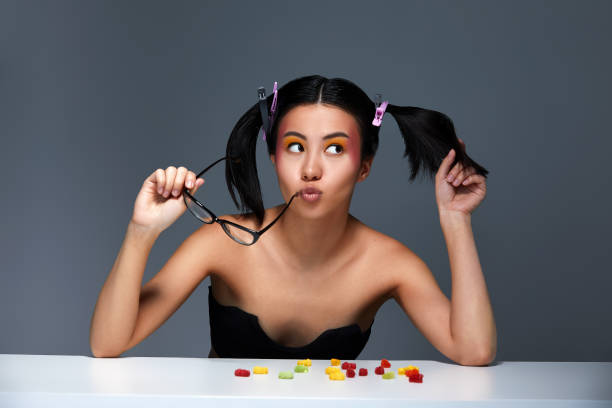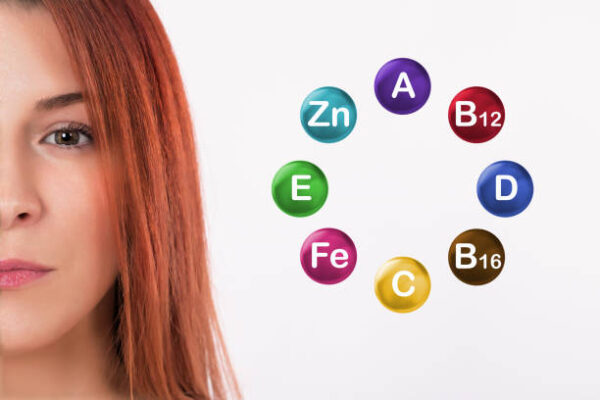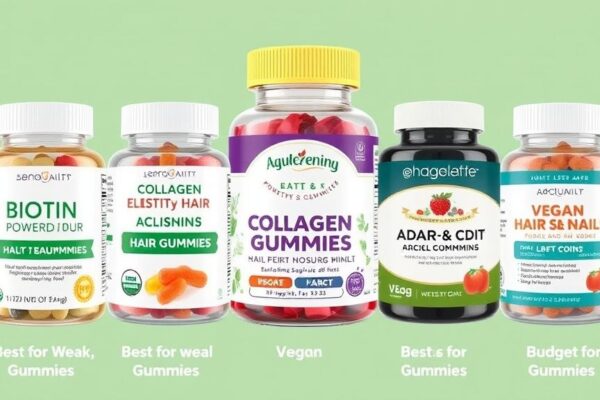Hair shedding can be unsettling, especially when you notice more strands on your pillow or in the shower than usual. One of the most overlooked causes of thinning hair is iron deficiency, a condition that affects how oxygen and nutrients reach your hair follicles. When your body doesn’t have enough iron, it struggles to produce hemoglobin in red blood cells, which directly impacts the growth cycle of your hair. This link between iron deficiency and hair loss is well documented, and addressing the root cause is often the first step to restoring healthy growth. Can Hair Gummies & Supplements
At the same time, many people turn to over-the-counter options like hair gummies or hair growth supplements. These chewable vitamins, often packed with biotin, collagen, vitamin D, and zinc, promise stronger strands and faster growth. But do they help when the underlying problem is iron deficiency? That’s what we’ll explore in this guide.
Learn how iron deficiency contributes to hair loss, what role hair vitamin gummies can realistically play, and how to choose supplements that actually support your needs. By the end, you’ll have a clear, evidence-based understanding of whether gummies alone are enough — or if targeted treatment for iron is the real solution.
How Iron Deficiency Causes Hair Loss
Iron is one of the most important minerals for your overall health, and your hair is no exception. When your body doesn’t have enough iron, it cannot make sufficient hemoglobin, the protein in red blood cells responsible for carrying oxygen. Without an adequate oxygen supply, your hair follicles don’t get the nutrients they need to stay in the active growth phase. This is why iron deficiency and hair loss often go hand in hand.
The first visible sign is usually increased shedding, a type of temporary loss called telogen effluvium. In this condition, more hairs than usual shift into the resting phase of the cycle, leading to diffuse thinning all over the scalp. Unlike genetic baldness, which follows predictable patterns, iron-related hair loss tends to appear as overall thinning and a noticeable reduction in hair density.
Other symptoms of low iron — fatigue, brittle nails, pale skin — often accompany the changes in your hair. If you’re noticing both hair shedding and these signs, it’s a strong indicator that iron deficiency and hair loss may be connected.
Correcting the deficiency through diet or prescribed supplements is critical. Foods rich in iron, like lean meats, spinach, and lentils, can help rebuild your stores, but in many cases, iron tablets are needed. While hair growth supplements and gummies may provide supportive nutrients such as biotin or collagen, they cannot replace the role of iron in follicle health. This is why addressing nutritional imbalances is key: healthy hair begins inside the body, not just with external care products.
When left untreated, low iron doesn’t just stall hair growth — it can prolong recovery and make regrowth slower, even after levels normalize. The sooner the deficiency is identified and corrected, the better the outlook for restoring strong, full hair.
Hair Gummies and Iron Deficiency — Do They Work Together?
The popularity of hair gummies has exploded in recent years. Marketed as tasty, chewable alternatives to pills, these supplements are packed with nutrients such as biotin, collagen, vitamin D, and zinc. For many people, they’ve become a go-to solution for thinning hair. But when the root problem is iron deficiency and hair loss, the question is: can these gummies really help?
Here’s the reality: most hair vitamin gummies do not contain iron. Manufacturers often avoid adding iron because it can alter the taste and stability of a gummy. Instead, the formulas emphasize biotin for keratin support, collagen for elasticity, and vitamins like D and E to reduce shedding. While these nutrients are beneficial for general nutrition and hair health, they don’t directly correct an iron deficiency.
That said, gummies are not useless in this context. They can act as supportive tools when used alongside iron supplements prescribed by your healthcare provider. For example, biotin gummies for hair may help strengthen the hair shaft once iron levels are corrected, and collagen hair gummies can improve overall strand quality. Think of them as complementary, not curative.
If you’ve been diagnosed with low iron, your first priority should be restoring those levels through diet or supplementation under medical supervision. A dermatologist or doctor may recommend combining iron with other vitamins to address overlapping deficiencies, such as vitamin D or B12. In such cases, hair growth gummies can provide these additional nutrients, making them a convenient add-on.
However, it’s important to manage expectations. No gummy will stop shedding overnight. Hair regrowth from iron deficiency typically takes three to six months, even with proper treatment. Gummies can support the process, but they cannot replace the central role of iron in follicle health.
Top Ingredients in Hair Gummies
One of the reasons hair gummies are so popular is their ingredient profile. They’re designed to deliver nutrients that support strong strands, healthy follicles, and sometimes even nails and skin. But when it comes to iron deficiency and hair loss, it’s important to understand what these products actually contain — and what they don’t.
Biotin (Vitamin B7): Perhaps the most famous addition, biotin supports keratin production, the protein that makes up hair, skin, and nails. Biotin gummies for hair are widely marketed because deficiencies can lead to brittle hair, but true biotin deficiency is rare. Still, supplemental doses may improve strand strength in those with fragile hair.
Collagen: Many brands now include hydrolyzed collagen peptides. Collagen hair gummies may improve elasticity and hydration, supporting healthier-looking hair over time. While collagen doesn’t treat underlying shedding, it can enhance the quality of new growth.
Vitamin D: Low vitamin D levels have been linked to hair thinning and slower follicle cycling. Adding this nutrient may be especially helpful for those with seasonal deficiencies. It’s a key reason people choose gummy vitamins for hair, skin & nails that go beyond biotin alone.
Zinc & Antioxidants: Zinc helps regulate oil glands and follicle health, while antioxidants like vitamins C and E protect against oxidative stress that can damage follicles.
What’s Missing — Iron: Most hair vitamin gummies do not contain iron. This is critical for anyone struggling with iron deficiency and hair loss, because without correcting the deficiency, these other ingredients cannot address the real cause of shedding.
Choosing the Right Supplement for Iron Deficiency and Hair Loss
If you’re dealing with iron deficiency and hair loss, the first step is always to confirm the diagnosis with a blood test. Once you know your ferritin and hemoglobin levels, your doctor may recommend iron tablets or liquid iron as the foundation of your treatment. These medical-grade supplements are the most effective way to rebuild iron stores and address shedding caused by deficiency.
That said, many people still want the added benefits of hair supplements that contain biotin, collagen, and vitamins like D and C. This is where hair gummies can be a useful complement. They can provide supportive nutrients that encourage stronger, healthier-looking strands while iron works on correcting the root cause.
When choosing a product, look for:
Third-party testing for purity and potency.
Transparent labeling, with clear doses for each nutrient.
Low sugar content, since many gummies are high in sweeteners.
Allergen-free formulas, especially if you’re sensitive to gluten, soy, or dairy.
Brand reputation, with reviews that go beyond marketing claims.
It’s also worth considering gummy vitamins vs pills. Gummies are easier to take consistently, but pills often allow for higher doses and may contain iron, which gummies usually don’t.
Best Hair Gummies in 2025 — Short Reviews & Who They Help Most
The market for hair growth supplements is bigger than ever, and gummies lead the way thanks to their taste and convenience. While they won’t correct iron deficiency and hair loss on their own, they can provide supportive nutrients that strengthen strands and improve overall hair quality. Here are some of the best hair gummies in 2025, along with who they’re best suited for:
1. Biotin-Powered Gummies (Best for Weak, Brittle Hair)
These are the classic biotin gummies for hair that focus on keratin support. They’re ideal if your main concern is breakage and lack of shine, but they won’t address iron-related shedding.
2. Collagen Hair Gummies (Best for Elasticity & Shine)
Formulated with hydrolyzed collagen peptides, these gummies help improve hair thickness and scalp hydration. Collagen supports overall nutrition and hair health, making it popular for anti-aging benefits.
3. Vegan Hair Gummies (Best Plant-Based Option)
Made without gelatin, these gummies cater to those on vegetarian or vegan diets. They often include biotin, vitamin D, and zinc. For someone managing iron deficiency and hair loss, they may need to be paired with a plant-based iron supplement.
4. All-in-One Hair, Skin & Nails Gummies (Best for Beauty Boost)
These blends include antioxidants like vitamins C and E, along with biotin. They’re perfect for users seeking full-spectrum beauty support, but iron is still missing in most formulas.
5. Budget-Friendly Gummies (Best for Beginners)
Lower-cost options deliver smaller doses of biotin and vitamin D. They’re a good entry point for those testing if gummies fit into their routine.
Hair gummies reviews often highlight improved texture and shine, but results vary. Remember, if your shedding is linked to iron deficiency and hair loss, only medical treatment with iron can restore growth. Gummies simply support the journey. Can Hair Gummies & Supplements
Safety, Side Effects & Dosage
When managing iron deficiency and hair loss, safety should always come first. Iron is a vital nutrient, but excessive intake can be harmful. That’s why supplementation should only be done under the guidance of a medical professional. Typical side effects of iron tablets include stomach upset, constipation, or nausea, which can often be reduced by taking them with food or using gentler liquid formulations.
Hair gummies, on the other hand, are generally safe when taken as directed. Because they’re fortified with vitamins like biotin, zinc, and collagen, excessive intake could cause mild issues such as skin breakouts, digestive discomfort, or imbalances if combined with other supplements. Always stick to the recommended gummy vitamins dosage on the label.
It’s also important to note that most hair supplements don’t contain iron. This means they can’t correct shedding caused by a deficiency on their own. They should be viewed as supportive, not curative.
Lifestyle Tips for Hair Recovery
Correcting iron deficiency and hair loss takes time, often several months before new growth is noticeable. While supplements play a central role, lifestyle habits can significantly speed up recovery and improve overall results.
- Focus on a Hair-Friendly Diet
Nutrition is the foundation of healthy hair. Include iron-rich foods such as lean red meat, spinach, lentils, and pumpkin seeds. Pair them with vitamin C sources like oranges or bell peppers to improve absorption. Omega-3s from fish or flaxseeds also support scalp hydration and shine. - Manage Stress Levels
Chronic stress can trigger or worsen shedding, even if iron deficiency is being treated. Incorporating relaxation practices like yoga, meditation, or daily walks can reduce the impact of stress on your hair cycle. - Prioritize Sleep and Hydration
Seven to eight hours of restful sleep and consistent water intake help regulate hormones and maintain circulation to the scalp—both critical for regrowth. - Support Scalp Health
A healthy scalp is the soil where hair grows. Gentle massage increases blood flow, while sulfate-free shampoos and avoiding excessive heat styling protect fragile strands.
Conclusion & Takeaway
Iron deficiency and hair loss can feel discouraging, but the good news is that this type of shedding is usually reversible. By identifying the deficiency through proper testing and addressing it with the right iron supplementation, you tackle the root cause directly.
That said, hair health is multi-dimensional. While iron restores growth from the inside out, supportive hair supplements like gummies provide additional nutrients such as biotin, collagen, and vitamins that enhance strength, shine, and resilience. Pairing the two creates a well-rounded approach—one that not only corrects deficiencies but also nurtures overall strand vitality.
Recovery takes patience, often several months before visible regrowth begins. But with consistent supplementation, a nutrient-rich diet, stress management, and scalp care, you can accelerate the process and enjoy healthier, fuller hair.
FAQs:
Can iron deficiency really cause hair loss?
Yes. Low iron reduces oxygen supply to hair follicles, weakening the growth cycle. This can lead to diffuse thinning, particularly noticeable around the crown and part line. Correcting a deficiency often restores growth, but results may take 3–6 months.
How do I know if my hair loss is from iron deficiency?
The only reliable way is through a blood test measuring ferritin and hemoglobin levels. Symptoms like fatigue, brittle nails, and pale skin may also accompany iron-related shedding.
Are hair gummies enough to treat iron deficiency and hair loss?
No. Most hair supplements and hair gummiesfocus on biotin, collagen, and vitamins. They support overall strand health but do not contain enough iron to correct a deficiency. If your shedding is iron-related, you’ll need doctor-prescribed iron supplementation.
Should I take biotin or iron for hair growth?
It depends on the root cause. Biotin deficiency is rare, but biotin can help strengthen brittle strands. Iron, however, is essential for restoring growth if you’re deficient. Many people benefit from combining both under medical guidance.
What’s the best diet for hair growth during iron deficiency recovery?
Aim for lean meats, lentils, beans, spinach, pumpkin seeds, and fortified cereals for iron. Pairing these with vitamin C-rich foods boosts absorption. A balanced diet with omega-3s and protein further strengthens new growth.




